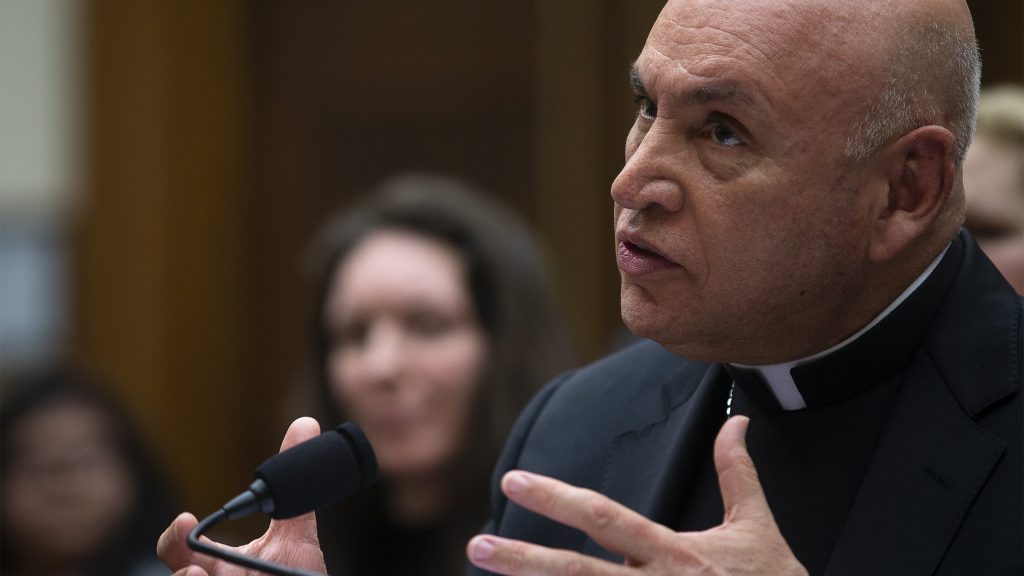The chairman of the U.S. bishops' migration committee marked the ninth anniversary of the Deferred Action for Childhood Arrivals program June 15 by urging Congress to act on creating a pathway to citizenship for its beneficiaries.
"Every day, DACA recipients make important contributions to their communities and the life of our nation," said Washington Auxiliary Bishop Mario E. Dorsonville, chairman of the U.S. Conference of Catholic Bishops' Committee on Migration. "During the COVID-19 pandemic, over 200,000 DACA recipients have served as essential workers, and they continue to demonstrate their resolve during this period of recovery."
"Yet," he added, "these young people have far too often faced uncertainty and rejection at the hands of our broken immigration system."
DACA was created by President Barack Obama by executive order June 15, 2012.
It allows a work permit and relief from deportation, among other benefits, for young adult immigrants in the country without documents who qualify -- those brought into the country illegally as children. The program does not provide a permanent solution so that they can legally remain in the country.
Though popular among Republicans and Democrats, efforts to pass a bill in Congress that would help put the group on a path toward permanent residency and eventual citizenship, have eluded past administrations.
"The Biden administration has identified immigration reform as a priority, and we look forward to seeing it realize that commitment through congressional engagement," Bishop Dorsonville said in his statement. "Meanwhile, the ideal time for Congress to act has long since passed, though the opportunity and imperative still remain."
"Dreamers," as the DACA beneficiaries and other young immigrants are called, "deserve relief," he said, as do those immigrants who are covered, he added, by the Temporary Protected Status and Deferred Enforced Departure programs, migrant agricultural workers and other essential workers who also are in the country illegally.
There are over 600,000 active DACA recipients currently living in the United States and as many as 3.6 million "Dreamers" total. According to a USCCB news release on the DACA anniversary, about 1.8 million of these Dreamers are eligible to be covered by DACA.
"As a church, we recognize the inherent, God-given dignity of every human person, regardless of immigration status," Bishop Dorsonville said. "Therefore, we will continue to call for comprehensive immigration reform that preserves family unity, honors due process, respects the rule of law, recognizes the contributions of foreign-born workers, defends the vulnerable, and addresses the root causes of migration, consistent with the common good."
Bishop Dorsonville submitted written testimony for a morning hearing June 15 held by the Senate Judiciary Committee on the proposed bipartisan American Dream and Promise Act of 2021.
The House passed its version of the measure March 18, along with the Farm Workforce Modernization Act, which provides a path to legal status for farmworkers.
The American Dream measure would create a "conditional permanent resident" status valid for up to 10 years that would protect DACA recipients and other Dreamers from deportation, allow them to work legally in the U.S. and permit them to travel outside the country -- if they meet several requirements, including: establishing they came to the U.S. before the age of 18 and have continuously lived in the U.S. on or before Jan. 1, 2021, and being able to pass government and background security checks. They also must pay a fee.
The bill also would allow TPS holders and individuals covered by the Deferred Enforced Departure program, known as DED, to get a "green card," a permanent resident card.
"Dreamers and TPS/DED holders are our neighbors, parishioners, and -- most importantly -- fellow children of God," Bishop Dorsonville said in his testimony. "We as a church have long advocated for their legal protection and full inclusion in the life of our country."
He noted the USCCB worked with members in the House and Senate on drafting the first versions of the DREAM Act in 2000 and 2001, "and it has been calling for passage of such a measure ever since."
Bishop Dorsonville said even as the USCCB welcomed Obama's creation of DACA, "it was not a substitute for enactment of the DREAM Act or similar legislative protections."
The full name of the DREAM Act was the Development, Relief and Education for Alien Minors Act.
Any measure Congress passes, the bishop said, should protect all Dreamers and offer them a path to citizenship; provide a path to citizenship for TPS and DED holders; and "maintain existing protections for unaccompanied children, asylum-seekers and family-based immigrants."
On March 19, in a joint statement, Bishop Dorsonville and Los Angeles Archbishop José H. Gomez, USCCB president, praised the House for passage of the two immigration bills a day earlier.
The measures, they said, "would help many hardworking immigrants reach their God-given potential, not only for their benefit but for that of the entire country." The two prelates urged the Senate to take "swift action" and pass the legislation.
In an "action alert" June 15, the Jesuit Conference of Canada and the United States, based in Washington, urged people to support a pathway to citizenship for DACA recipients, TPS holders and immigrants in the country illegally by sending a message to the Senate to pass the American Dream and Promise Act of 2021.
The conference's website has a link for sending messages: https://bit.ly/3cH8d8k.
These immigrants "are members of our communities and an integral part of this nation," said Jesuit Father Ted Penton, secretary of the conference's Office of Justice and Ecology. "They deserve the protection and opportunity of a clear path to citizenship."

